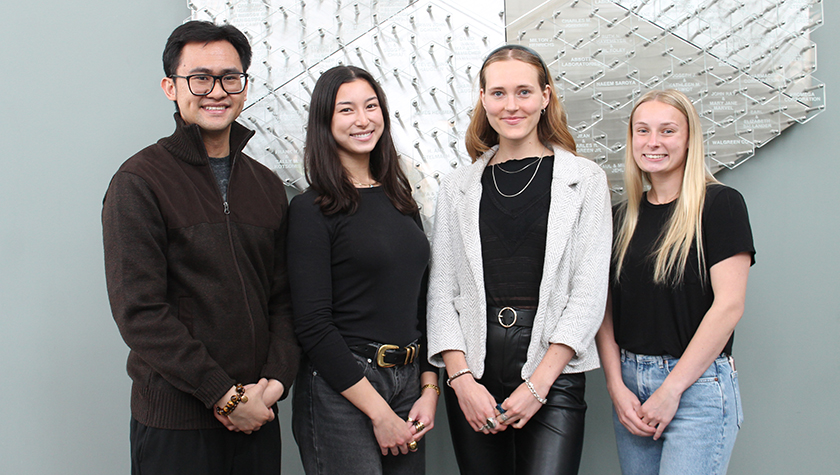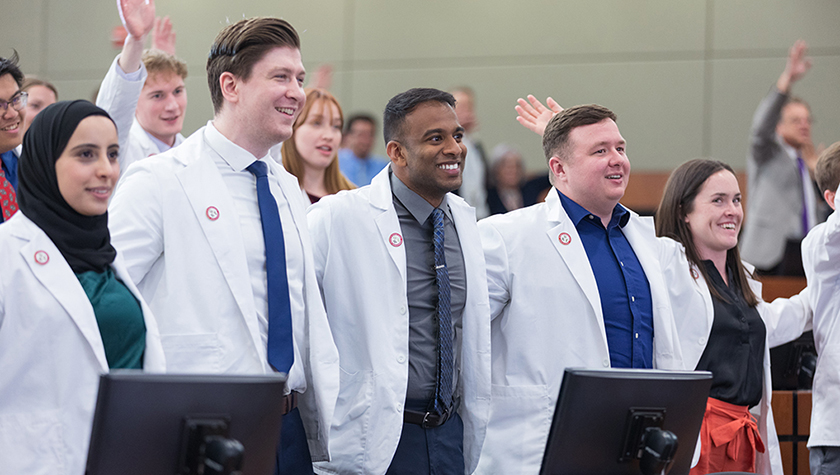
The School’s exceptional training prepares graduates for success in clinical care, leadership, and innovation
By Katie Ginder-Vogel
When it comes to preparing future pharmacists for high-impact clinical careers, the University of Wisconsin–Madison School of Pharmacy continues to lead the way. For the Class of 2025, the School has achieved a perfect 100% residency match rate in the American Society of Health-System Pharmacists (ASHP) Match — a remarkable feat for the second consecutive year, which reinforces the School’s reputation as a national leader in pharmacy education.
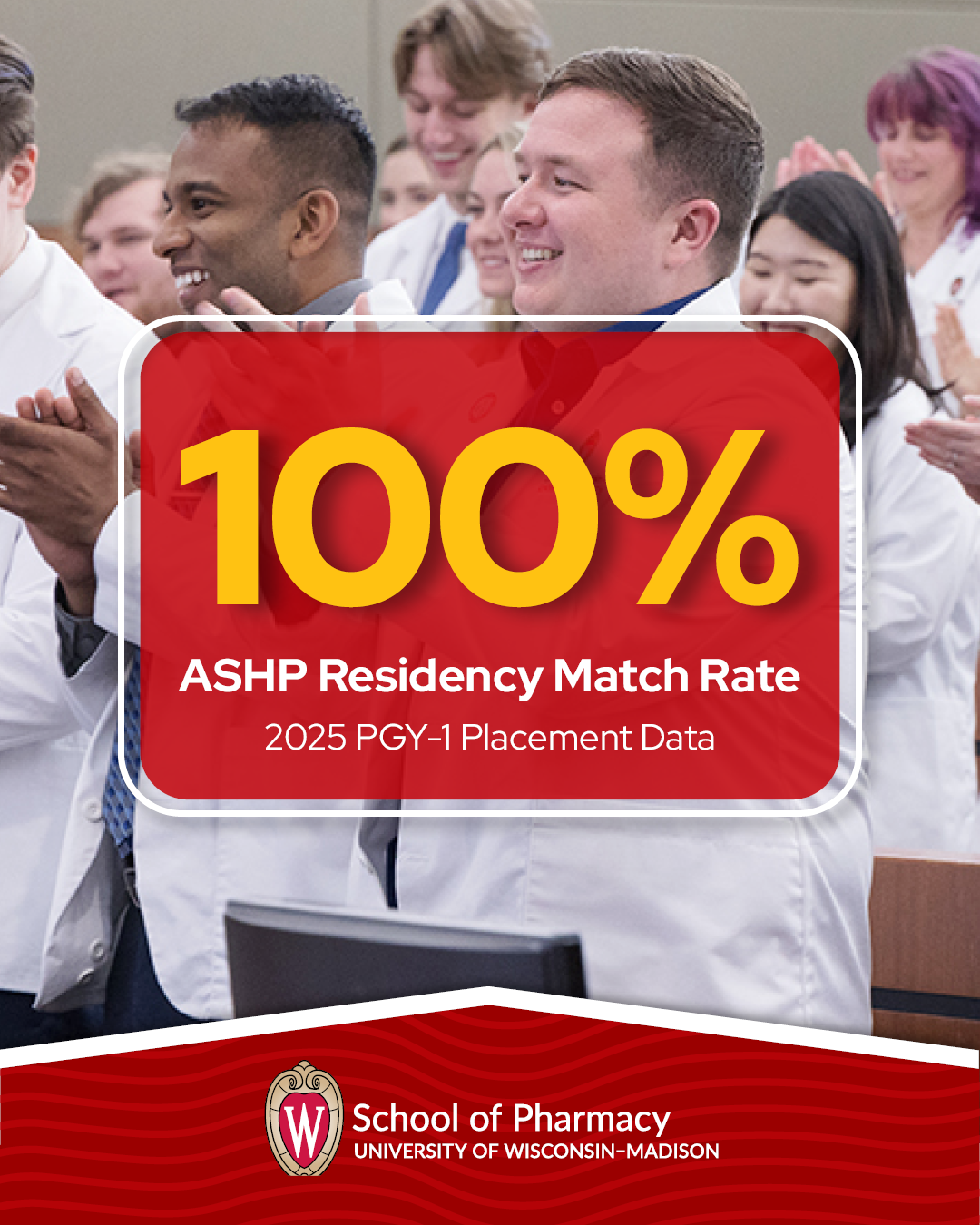
All 83 of the School’s PharmD students who participated in this year’s match, including 80 members of the 2025 graduating class, successfully secured PGY1 residency positions. Among the six schools with the most match participants, the School of Pharmacy stands alone at the top with its unmatched success rate — a distinction shared only with four other schools, each with 12 or fewer applicants.
As the role of pharmacists expands across the healthcare spectrum, this impressive match result highlights the School’s long-standing commitment to innovation, excellence, and preparing graduates for the future of pharmacy practice.
According to the National Bureau of Labor Statistics, pharmacist jobs are projected to grow 5% between 2023 and 2033, with about 14,200 openings projected each year, on average, over the decade. Demand is particularly expected to increase for pharmacists in healthcare settings like hospitals and clinics, as pharmacists are integrated into healthcare teams to provide medication management and other patient care services.
“Our courses prepare our graduates to practice in the real world, and I hear from our alumni who are preceptors that our students perform at a very high level and are ready for practice,” says Professor Melgardt de Villiers, associate dean for academic affairs at the School of Pharmacy. “By the time they get to their fourth year, they are strong communicators and trustworthy practitioners, thanks to their work in lab courses, extracurricular activities, and working with patients early on, which prepares them to apply for residencies.”
Building clinical expertise through longitudinal experience
The School of Pharmacy’s long history of exceptional residency match rates is the result of purposeful innovation. Through forward-thinking programs and hands-on clinical experiences, the School prepares students to thrive in an evolving pharmacy landscape, which makes them stand out as competitive residency candidates.
One key avenue is the Residency Track APPE (APPE RT), which gives PharmD students the opportunity to gain a deeper understanding of a single health system by completing six of their eight six-week Advanced Pharmacy Practice Experience (APPE) clinical rotations in the same health system. These sequential rotations give PharmD students a longitudinal experience with more depth. This past year, 38 pharmacy students participated in the APPR RT program.
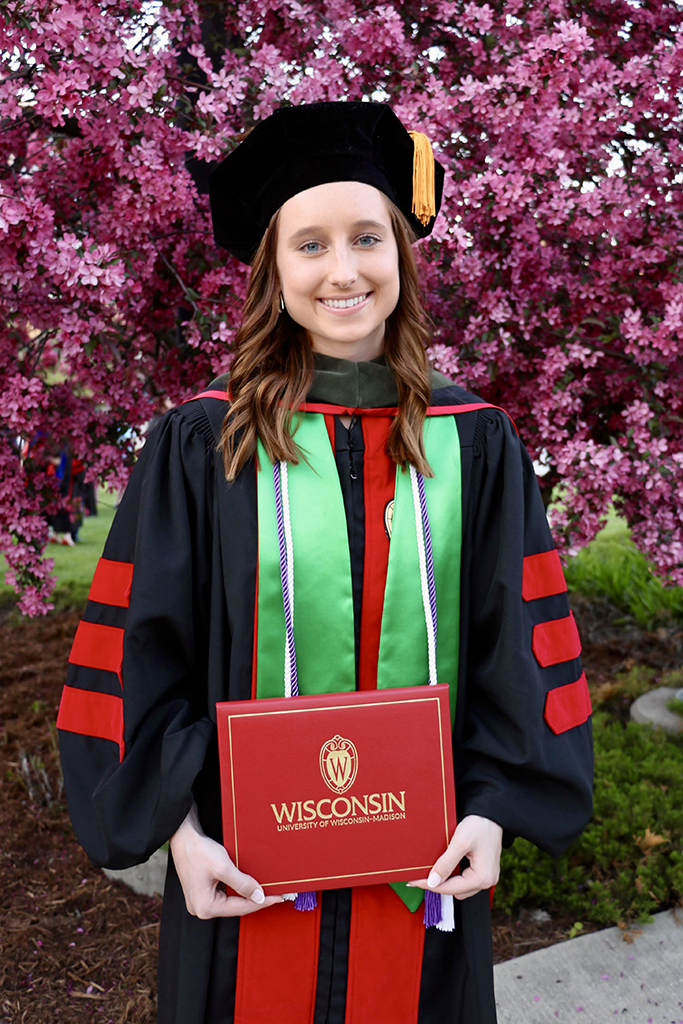
“Our Residency Track APPE program is unique because we require the mentoring, journal clubs, and special projects,” says Mara Kieser, assistant dean of experiential education and professor in the Pharmacy Practice and Translational Research Division. “The whole point of the APPE RT is to be able to give our students an extra edge in this very competitive market and provide them with the skills they will need to succeed.”
The School of Pharmacy offers robust experiential opportunities for PharmD students, with clinical rotation sites across seven states and five countries — including throughout Wisconsin — spanning community pharmacy practice, specialties like geriatrics and infectious disease, as well as research and teaching.
“We offer a wide variety of pharmacy practice experiences that will help students try out new experiences and learn more about their own practice interests,” says Kieser. “Our student pharmacists have the opportunity to interact with top practitioners in the state to network and develop long-lasting relationships that will help them advance their careers.”
“I also had an internship at Mayo Clinic in Rochester after my second year, where I did research and quality improvement projects — it was like a mini residency, and I have publications from that experience,” Kuhn says.
Alyssa Kuhn (PharmD ’25), who matched with a PGY1 acute care residency at Northwestern Memorial Hospital in Chicago, pursued a diverse slate of APPE experiences, including public and private sector rotations at the VA, and an international rotation in South Africa.
“I hear from our alumni who are preceptors that our students perform at a very high level and are ready for practice.”
—Mel de Villiers
“We develop clinical skills in our APPEs, and I wanted to take the next step to further deepen my skills,” she adds. “I want to specialize in solid organ transplant and do more rotations surrounding that, then do a PGY2 second-year residency in that specialty.”
Distinction through specialization
The School’s Scholars in Pharmacy programs — which offer specializations in research, psychiatric pharmacy, antimicrobial stewardship, rural health, and more — are another way for student pharmacists to distinguish themselves when applying to jobs and residencies.
“112 of the students that graduated in 2025 participated in one of our Scholars in Pharmacy programs, which allow them to dig deep into a certain subject area,” says de Villiers. “When they apply for a residency and interview, these experiences make them quite impressive because they can speak in detail about these topics.”

Kuhn earned a Global Health Certificate from the School and worked with the School of Pharmacy’s Director of Global Health Laurel Legenza (PharmD ’13) on research. As former co-president of the Student Pharmacists in Global Health organization, she plans to keep global health as a mainstay in her career. One reason she selected Northwestern Memorial Hospital was its commitment to educating residents about the social determinants of health.
Another specialization, the Pharmacy Operations and Technology Management (OTM) PharmD option — the first of its kind in the U.S. — allows students to combine their health care knowledge with MBA-level coursework in management and information technology.
“Our students look attractive to industry because of the program we have with the School of Business,” says de Villiers, also noting that graduates are increasingly being selected for fellowships. “They are going all over the country for residencies and fellowships, so they are competing very successfully across the country, with other students from very good schools.”
Cultivating leadership
The School also emphasizes professional development, mentorship, and early patient interaction, equipping students to thrive in residency interviews and beyond.
Lauren Glaza (PharmD ’25) matched with the dual Health System Pharmacy Administration residency and master’s degree program offered jointly by UW Health and the School of Pharmacy — a program designed to produce national leaders in health system pharmacy. Glaza has been building her leadership skills throughout pharmacy school.
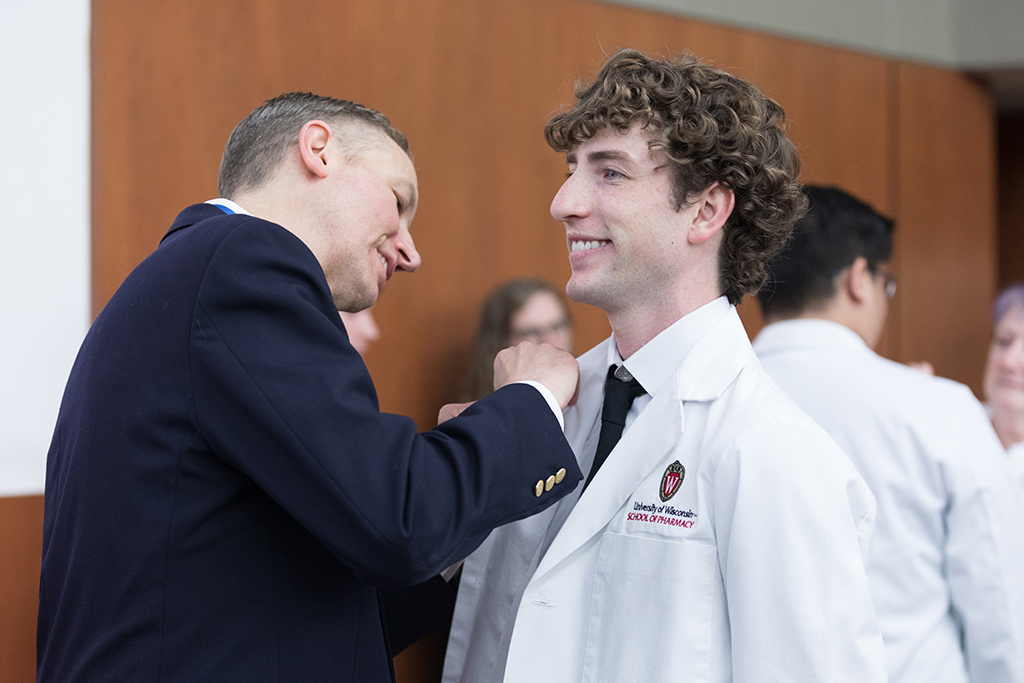
“At the School, I gained experiences that provided me with a passion for leadership within pharmacy and advancing pharmacy practice,” she says. “I loved working with my peers and other pharmacy students from across the states to provide opportunities for pharmacy students to gain experiences outside of the classroom by engaging with those in the community.”
Glaza completed the School’s Path of Distinction in Leadership, which helped her reflect and think creatively about ways to innovate in pharmacy practice.
“I was already engaging in leadership and volunteer experiences, but this pushed me to find more meaning in my experiences and reflect on how these experiences affect my personal and professional development,” she says. “It tied the components together to make my experiences more meaningful to me.”
Jacob Deheck (PharmD ‘25), who will pursue his PGY-1 specialty medicine residency at Scripps Health in San Diego, California, also believes his research and leadership activities were critical to his successful placement. He says he felt confident communicating about how his experiences facilitated his abilities as a pharmacist.
“At the School, I gained experiences that provided me with a passion for leadership within pharmacy and advancing pharmacy practice.”
—Lauren Glaza
“My residency will allow me to practice both my interests of specialty medicine and ambulatory care, in hopes that they will guide my career aspirations,” he says. “I’m excited for the opportunity to immerse myself into life as a practicing pharmacist in a completely different area of the country and an entirely new health system.”
Poised to shape the future of pharmacy
The School of Pharmacy’s residency-bound graduates are heading to 21 states across the country, from Florida to California, Massachusetts to Washington. Through their residencies, they’re preparing to transform care in oncology, ambulatory care, cardiology, community pharmacy, acute care, infectious diseases, and more.
Deheck plans to build his clinical expertise to leverage in a future administrative or leadership role.
“I am highly focused on creating a strong clinical knowledge base before pursuing these aspirations in the coming years,” he says.
Glaza, who has a clinical interest in mental health, is considering working in psychiatric medicine.
“Mental health services are waning in a time where they are very much needed, so I hope to take my skills in pharmacy leadership and work with other disciplines to maintain or expand services in some way,” Glaza says. “I am very open-minded and cannot wait to gather new experiences in residency.”
